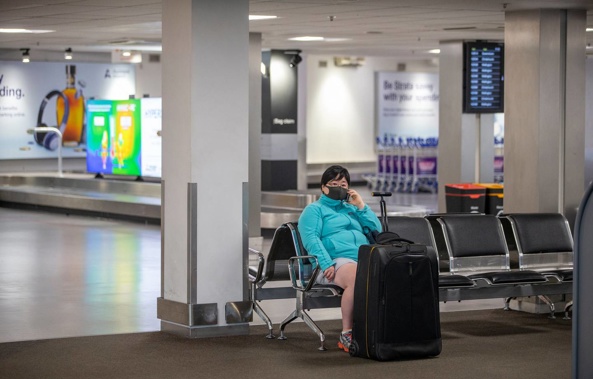
Auckland Airport is planning around losing up to a quarter of its staff during the Omicron outbreak.
The airport says it was working on a scenario allowing it to remain open with more than 25 per cent of "business-critical staff" unable to come to work.
The company has about 290 front line workers and is the latest firm to outline the impact of the "big sick" when staff become ill or are forced to isolate because of Omicron.
Air New Zealand - which today announced it was offering domestic passengers credits and more fare flexibility because of Omicron - is also expecting more staff to be off work in the coming weeks.
Auckland Airport's general manager of operations Anna Cassels-Brown said two years of working around the clock with the risk of Covid-19 had laid the foundation for the airport's planning, but the highly infectious nature of new variants meant the strategy needed to evolve.
"Whether it's having the skills to fight an aviation fire or direct a plane on the apron, many in our team are specialists performing unique roles that aren't easily replaced or switched around."
The airport needed plans in place to mitigate not only the health risk to staff but also the operational risk to the airport so it can keep on providing those vital connections for people and essential goods, she said.
"Our health and safety practices have served us really well to this point, but if we look overseas, we can see Omicron brings additional challenges particularly in managing shifts and rosters with high rates of staff off sick or needing to care for family members who are unwell."
Auckland Airport handles about 90 per cent of New Zealand's international passenger arrivals and departures and air cargo, including the delivery of vaccines, PPE, and other time-critical, high-value goods.
Its front line staff perform a variety of operational roles, from airfield safety officers through to terminal-based guest service staff.
Auckland Airport's total staff is around 450.
Last year it was part of a group of companies pushing a reluctant Government to introduce rapid antigen tests for surveillance testing and two years into the pandemic says
"Whether it's a handful of flights a day or hundreds, there is a minimum level of staffing and service required to safely keep the aerodrome open,'' said Cassels-Brown.
There were dozens of other organisations that are essential to keeping the airport running providing services from refuelling to aircraft waste removal.
"Running the airport is a team effort and the whole system has been working together to ensure the airport keeps operating in an environment where we have Omicron."
With the spread of Omicron and the shift to the Red traffic light setting the airport had moved introduced new measures alongside existing measures. These include:
- Splitting the employees into work bubblesorganisation-wide.
• Vaccination requirements for all staff and visitors, including external contractors.
• Splitting shifts into two or more operational "bubbles within a bubble".
• Excluding all visitors from safety-critical workspaces including the Airport Emergency service station, apron control tower, and operations centre.
• Using high-frequency RAT testing alongside nasal pharyngeal and saliva PCR surveillance testing.
Last year it was part of a group of companies pushing a reluctant Government to introduce rapid antigen tests for surveillance testing which it introduced.
Cassels-Brown said that two years into this pandemic there was yet to be an Auckland Airport staff member become infected while at work.
"Which is a testament to the character of our people and their meticulous approach to their own and their colleagues' health and safety. However, we know the infectious nature of this new variant has reset the rules."
Take your Radio, Podcasts and Music with you









